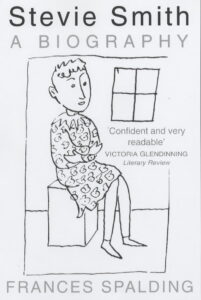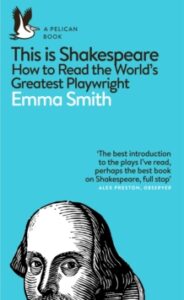Showing 33–48 of 69 results
-

R120“For him [Milan Kundera], the novel was the highest form of aesthetic endeavor, a kind of anti-scripture representing the sensibility of the individual, containing “an outlook, a wisdom, a position… that would rule out identification with any politics, any religion, any ideology, any moral doctrine, any group.” – David Samuels
-

R120“There is no Frigate like a Book
To take us Lands away,
Nor any Coursers like a Page
Of prancing Poetry –
This Traverse may the poorest take
Without oppress of Toll –
How frugal is the Chariot
That bears a Human Soul.”
Emily Dickinson
-

R360Stevie Smith had a unique literary voice: her idiosyncratic, wonderfully funny and poignant poems established her as one of the most individual of English modern poets. She claimed her own life was ‘precious dull’, but Frances Spalding’s acclaimed biography, revised with a new introduction for this centenary edition, reveals a far from conventional woman.
-

R200Combative, volatile, constantly on the verge of exploding, Dwayne and Shanell Combrink are two halves of a white South African working-class couple, when Namhla Gumede, born on 16 June 1976, arrives on their doorstep. A smouldering dark comedy suddenly leads to startling revelations, rage and recrimination
-

R100Makhosazana Xaba, with several collections and anthologies to her name, is at the forefront of a poetry that embraces penetrating socio-political insight with highly emotional responses to the love and pain that our country provides in such abundance.
-

R220Lucky has been brought up in a small rural black community. But is he really black?… Issues of identity and belonging crowd in on Lucky, who is thrown off balance by the publicity surrounding him , yet enjoys the attention and sudden ‘celebrity’ this brings. In the end, who is Lucky?
-

R250A writer of restless enquiry and breadth of learning, Valerio Magrelli bids fair to be the most important poet of his generation in Italy, as witnessed by the critical attention that his work has received and the major prizes it has garnered.
-

R250In some dystopian future, all homo-sexual people have been shipped into space. From his hermetically sealed pod, the Boy looks down on a ruined , devastated Earth. It is a story of loss, grief and isolation.
-

R230This electrifying new book thrives on revealing, not resolving, the ambiguities of Shakespeare’s plays and their changing topicality. It introduces an intellectually, theatrically and ethically exciting writer who engages with intersectionality as much as with Ovid, with economics as much as poetry: who writes in strikingly modern ways about individual agency, privacy, politics, celebrity and sex.
-

Craig Higginson’s first three plays for adult audiences – collected here in one volume – represent one of the strongest debuts in contemporary South African theatre. Although each can be seen as a variation on the theme of the post-apartheid state of the nation play, they are also engaged with realities in Zimbabwe, the Congo and contemporary Europe. Higginson’s experience of growing up in wartorn Zimbabwe and apartheid South Africa have given him a deep-rooted and potent angle from which to dramatize a dialogue between Europe and Africa.
-

R200In Transcontinental Delay, Simon Van Schalkwyk tracks experiences of imminent arrival and departure, periods of waiting and suspension between destinations, points where the demands of place dissolve into the more anticipatory potentialities of space.
-

R120In this debut collection of 48 poems, Sizakele Nkosi reflects on her childhood and daily life and relationships in Soweto, the heartbeat of Black Jozi.
-

R180Evil stalks the township of KwaMashu, near Durban. It comes in the form of Whoonga, a toxic mix of B-grade heroin, rat poison and other chemical components that almost immediately sucks its users into the vortex of addiction and the crime, deception and personal tragedy that goes with it. Caught up in the web, the ulwembu of the title, presided over by the dealer, Bongani Mseleku, are Lieutenant Portia Mthembu, a police officer in the frontline of the fight against the scourge; her son Sipho; his friend, Andile Nxumalo, and Emmanuel Abreu, a Mozambique-born spaza shopkeeper.
-

R120The carefully modulated surface of Stuart Payne’s poems belies the intriguing, startling and thought-provoking depths of thought and perception. Such deliberate tensioning between the obvious and the hidden allows him to craft finely judged poems that reward rereading. Whether evoking the touch of the sun or the sound of an old tape recording, his universe is both vivid and uncertain as past, present and future are considered and reconsidered, and the distance between minds is sensed and explored.
-

R150What Remains is a fusion of text, dance and movement to tell a story about the unexpected uncovering of a slave burial ground in Cape Town, the archaeological dig that follows and a city haunted by the memory of slavery. When the bones emerge from the ground, everyone in the city – slave descendants, archaeologists, citizens, property developers – is forced to reckon with a history sometimes remembered, sometimes forgotten.
-

R120“Zabalaza Republic reiterates the need for my people to find value in our blackness. For my generation, the battle against white supremacy culture has taken on psychological implications echoing sentiments of what Du Bois referred to as double consciousness. My poetry comes from the wreck left behind after ethnic and racial collisions. For me, this book represents an optimistic step forward towards healing and a return of black self-love.’’
As Sihle Ntuli describes the essence of his collection, the poems encompass numerous aspects of black alienation resulting from collisions with the white world, which despite the ‘zabalaza’ seemingly having been won in 1994, still remains the ruling environment.
















